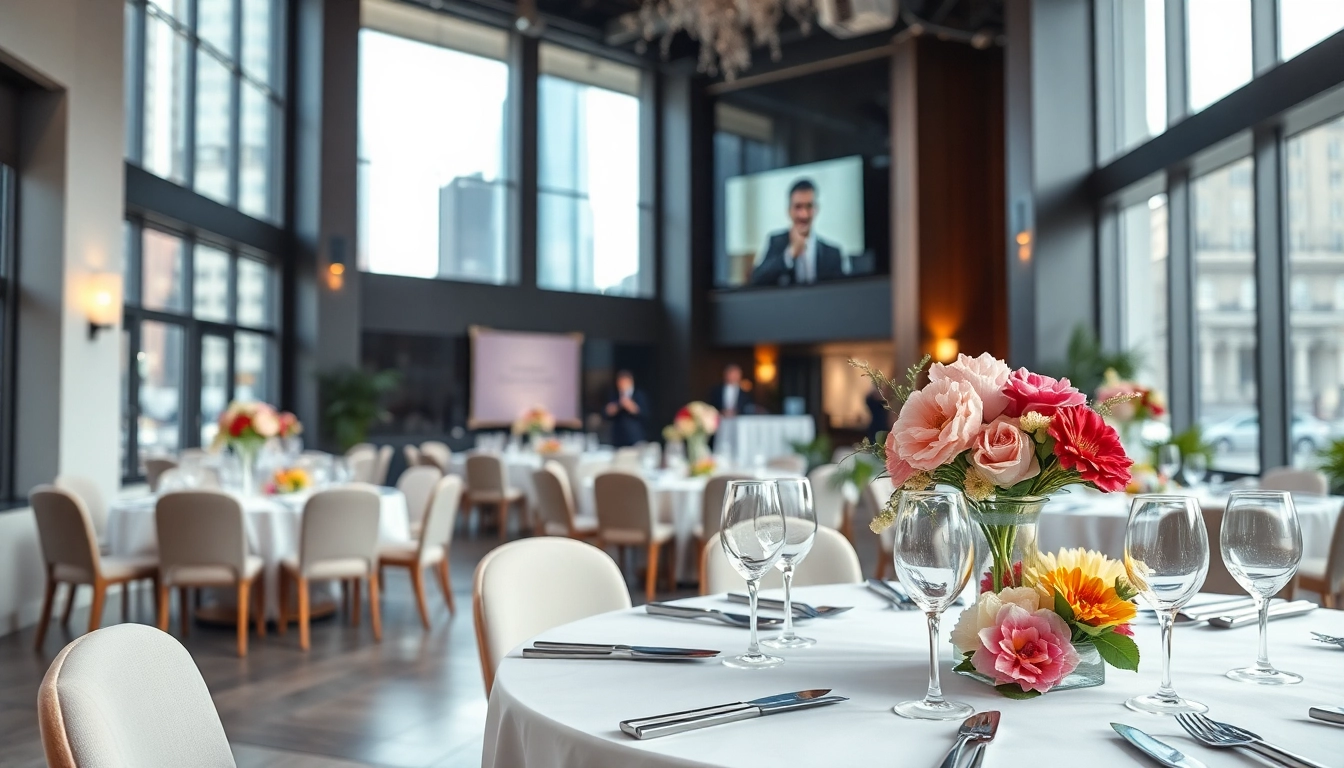Understanding Your Needs for an Event Space
Choosing the right event space is crucial for the success of any gathering, whether it’s a corporate meeting, wedding, or social event. Understanding your specific needs is the first step in this process. By defining your event goals, identifying essential features, and considering your budget, you set the stage for a successful experience. Here’s how to effectively assess your requirements.
Defining Your Event Goals
Your event goals are the foundation upon which you will build every other aspect of your planning. How do you envision your event? Is it a celebratory gathering, a strategic meeting, or an educational seminar? Start by listing the objectives you aim to achieve. For example, if your goal is to celebrate a milestone, your space needs to foster a convivial atmosphere. If your objective is networking, your layout should encourage interactions among attendees. Clearly defined goals not only drive your choice of event space but also inform important logistical decisions like catering, décor, and technology needs.
Identifying Key Features of an Event Space
Once your goals are clear, think about the features that are essential for realizing them. Important considerations include:
- Capacity: Can the venue comfortably accommodate all guests? Ensure it has adequate space for seating, mingling, stages, or booths, depending on your setup.
- Accessibility: The event space should cater to all attendees, including those with disabilities. Check for ramps, elevators, and convenient restroom facilities.
- Facilities: Does the venue provide audio-visual equipment, Wi-Fi, and lighting options? These technical aspects can greatly impact your event’s execution.
- Aesthetic Appeal: The visual elements of the space can enhance the event’s theme. Consider natural lighting, décor, and overall atmosphere.
Budget Considerations for Renting an Event Space
The financial aspect of renting an event space is paramount. Establishing a sensible budget will guide your options and can prevent overspending. Factor in the following:
- Rental Fees: Understand what the venue charges and what is included in the package — are tables, chairs and basic décor included, or will these be extra?
- Service Costs: Many venues charge additional fees for cleaning, security, and other services. It’s wise to clarify all potential costs upfront.
- Catering and Bar Service: Often, venues have in-house catering, or they may require you to hire your own. Be aware of any additional fees related to food and drinks.
Types of Event Spaces Available
Understanding the different types of event spaces can expand your options significantly. Each comes with distinct attributes suited to various functions.
Indoor vs. Outdoor Event Space Options
Choosing between indoor and outdoor spaces involves several considerations:
- Weather Dependency: Outdoor venues can be stunning but are often vulnerable to weather changes. A backup plan is essential for outdoor events.
- Ambiance: Outdoor spaces often provide a natural ambiance and scenic views, while indoor venues tend to offer a controlled environment with consistent lighting and temperature.
- Capacity and Layout: Consider the layout of your event. Some gatherings, such as weddings with dancing, might benefit from larger outdoor spaces, while corporate meetings might be better suited for enclosed areas.
Unique Venues for Exclusive Experiences
Differentiating your event can be achieved through choosing a unique venue—a historic building, art gallery, or a converted warehouse can add an original touch. These spaces often come with a character that enhances the event’s theme or purpose. When selecting unique venues, consider:
- Theme Alignment: The character of the venue should complement your event’s theme. For instance, an art gallery could provide a fitting backdrop for an exhibition or a creative workshop.
- Audience Engagement: Unique spaces often prompt more interaction among guests, which can enhance networking and collaboration.
- Logistical Layout: Ensure the layout works well for your program. Unconventional spaces sometimes require additional planning for sound, lighting, and accessibility.
Customizing Your Chosen Event Space
Customization is essential for making the event space feel personal and tailored to the occasion. Consider the following strategies:
- Decor & Theme: Use decorations that reflect your event’s theme—color palettes, floral arrangements, and signage can all bolster the message you want to convey.
- Branding Opportunities: For corporate events, consider adding company logos to displays, signage, or even subtle elements like color choices and branded materials.
- Technology Integration: Depending on your objectives, invest in technology that complements your event. This might include presentation tools, live streaming equipment, or interactive kiosks.
Location Matters: Getting the Right Event Space
The location of your event space is crucial, as it affects accessibility, attendance, and the overall experience of your guests.
Accessibility Considerations for Your Guests
Ensuring easy access is vital for all attendees. Reflect on the following:
- Transportation Links: Ideally, the venue should be near key transportation points—airports, major roads, and public transit systems to facilitate ease of arrival and departure.
- Parks and Accommodations: Providing information on nearby accommodations or suggesting local parks can enhance the experience for travel guest.
- Parking Availability: If attendees are driving, consider the availability and security of parking options.
Proximity to Amenities and Accommodations
Location should also consider the needs of your attendees beyond the venue itself:
- Nearby Restaurants: If your event is extended, consider the availability of dining options, which encourages networking and camaraderie after formal activities.
- Hotels: Having a variety of hotel options nearby can enhance your guests’ convenience, especially for multi-day events.
- Entertainment Options: Sharing information about local attractions can make your event seamless and enjoyable.
Utilizing Local Attractions to Enhance Your Event Space
Leveraging local attractions can enhance the appeal of your space:
- Local Culture: Incorporating local culture into your event can create an unforgettable experience. This can involve local cuisine, entertainment, or decor.
- Group Activities: Planned activities outside the event can promote team building and create lasting memories. Consider guided tours, group dinners, or recreational activities that fit with your event theme.
Common Challenges When Booking an Event Space
The journey to securing the right event space can be fraught with challenges. It’s crucial to anticipate potential issues and have solutions in mind.
Dealing with Venue Restrictions
Many venues have specific policies and restrictions. Being prepared for this helps avoid conflicts:
- Policies on Alcohol and Catering: Some venues may have exclusive catering services or restrictions on bringing in outside alcohol. Always confirm these details during negotiations.
- Noise Restrictions: Understand the venue’s policies regarding noise, especially if you plan to have music or presentations. Be aware of curfews or other limitations.
- Setup and Clean Up Times: These logistics can greatly affect your planning. Ensure there’s ample time post-event for cleanup if the venue requires it.
Adapting to Last-Minute Changes
Flexibility is key when unforeseen changes occur. Here’s how to adapt:
- Backup Plans: Always have contingency plans in place for elements like weather, catering, or technology failures.
- Communication: Ensure your team knows who to contact for each aspect of the event. Clear communication can lead to quick resolutions.
- Vendor Relationships: Maintain positive relationships with vendors. They can often provide solutions or alternatives in critical moments.
Managing Vendor Coordination at the Event Space
Efficiently coordinating vendors can streamline the event process:
- Vendor List: Create a comprehensive list of all vendors — caterers, decorators, AV teams — with clear points of contact.
- Timeline Creation: Develop a timeline that delineates when each vendor arrives and what tasks they need to accomplish. This can mitigate confusion on the day of the event.
- On-Site Coordination: Designate a point person for vendor communication throughout the event day, helping ensure everyone is on the same page.
Maximizing Your Event Space Experience
After selecting an ideal event space, maximizing it becomes the next objective. Engage your attendees and optimize the physical environment to enhance their overall experience.
Creating an Inviting Atmosphere
The atmosphere sets the tone for your event. Utilize these tactics to create an inviting space:
- Welcoming Decor: Lively flowers, comfortable seating arrangements, and personal touches create a warm and inviting environment.
- Music and Sound: Curate playlists or hire live performers to blend seamlessly into the ambiance without overpowering conversations.
- Personalized Greeting: A welcoming committee can help form connections with guests as they arrive, providing a touch of hospitality that sets a positive tone.
Event Layout and Flow Best Practices
An efficient layout promotes mobility and encourages interaction among attendees:
- Traffic Flow: Design pathways that guide attendees naturally from one area to another. Keep high-traffic areas clear of obstacles.
- Seating Arrangements: Use various seating styles to promote comfort and interaction—round tables encourage discussion, while rows might be suitable for presentations.
- Activity Zones: If applicable, create distinct areas for different activities (networking, dining, presentations) to help maintain focus and flow.
Post-Event Considerations for Your Chosen Event Space
Reflection after the event is important. Consider the following to maximize effectiveness:
- Feedback Collection: Use surveys or direct communication to gather input from attendees and vendors about their experiences.
- Evaluating Success: Compare outcomes against your initial goals. Conduct a debrief with your planning team to discuss what worked and what could improve next time.
- Disconnecting the Space: Ensure to follow up with the venue manager or contact person to resolve any outstanding items and receive any security deposits back.



